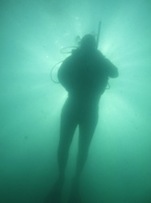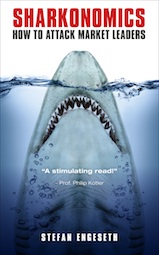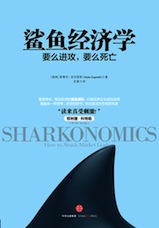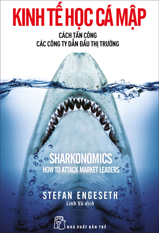 Sharks are not only nature’s most revered killing machines, they are highly strategic and efficient predators. Studying their behaviour and instincts can provide lessons for companies of any size who want to attack the competition.
Sharks are not only nature’s most revered killing machines, they are highly strategic and efficient predators. Studying their behaviour and instincts can provide lessons for companies of any size who want to attack the competition.
Stefan Engeseth, author of the new book Sharkonomics, argues that taking market share from market leaders is about being aware, creating presence and punching above your weight. By applying the behavioural traits of the shark, Engeseth has created a number of highly practical business strategies which include striking unpredictably, developing a sensory system, hunting in packs and how to locate blind spots. The more competitive your marketplace, the more effective Sharkonomics can be. After all sharks have been evolving for over 420 million years and are still very much the leaders in their space.
 Why Sharkonomics?
Why Sharkonomics?
Quite simply, nature is smarter than the likes of Stanford, Harvard, MIT, McKinsey, Boston Consulting Group, Bain, IBM, Apple and all of the other Fortune 500 companies. In nature, sharks have to move to survive. But in business most market leaders remain static, because they are stuck in history – and eventually they become shark food. Sharks don’t perform by producing endless Power Points; they bite into market share. Sharkonomics will reveal how the logos of market leaders will have more chunks taken out of them than a seal after a shark picnic.
It’s not just about attack
Sharkonomics also includes tactics for companies to defend themselves against attack. It is important to state that Sharkonomics is inspired by nature, but Engeseth’s intention is not to spread fear in any form—except perhaps in boardrooms! Stefan Engeseth, the author of Sharkonomics, dived with sharks in South Africa as part of his research for the book!
Take a bite of this new book at www.sharkonomics.com
For more information, videos and book samples go to www.sharkonomics.com.
About the author
 Stefan Engeseth is one of Europe’s most creative business thinkers and a top-ranked speaker. This is his fourth book. He is also a consultant and CEO of Detective Marketing™.
Stefan Engeseth is one of Europe’s most creative business thinkers and a top-ranked speaker. This is his fourth book. He is also a consultant and CEO of Detective Marketing™.
If you’d like to talk to or interview the author, please send Stefan an Email or call +46704443354.
Sharkonomics: How to Attack Market Leaders is published in April 2012 by Marshall Cavendish priced UK£10.99. It is sold in all good bookshops globally as well as via Amazon.co.uk and Amazon.com.
Endorsements for the book: Prof. Philip Kotler, Brian Solis and Merci Olsson, Marketing and Communications Director, Nobelprize.org read more at www.sharkonomics.com.
• Contact information.
• Press room (book cover, shark pictures, author portrait and graphics).
• About the author.
• www.sharkonomics.com.
• PRESS RELEASE: Sharkonomics: word / PDF. English (EMEA), French, German, English (US) (28/3-2012).
 I love the sea and blogging. Tom Woodnutt at Feelingmutual.com shares his recent presentation about social media research. I strongly recommend jumping into: ‘Fishing for Insight in a Sea of Social Media’.
I love the sea and blogging. Tom Woodnutt at Feelingmutual.com shares his recent presentation about social media research. I strongly recommend jumping into: ‘Fishing for Insight in a Sea of Social Media’.








 Sharks are not only nature’s most revered killing machines, they are highly strategic and efficient predators. Studying their behaviour and instincts can provide lessons for companies of any size who want to attack the competition.
Sharks are not only nature’s most revered killing machines, they are highly strategic and efficient predators. Studying their behaviour and instincts can provide lessons for companies of any size who want to attack the competition. Why Sharkonomics?
Why Sharkonomics? Stefan Engeseth is one of Europe’s most creative business thinkers and a top-ranked speaker. This is his fourth book. He is also a consultant and CEO of Detective Marketing™.
Stefan Engeseth is one of Europe’s most creative business thinkers and a top-ranked speaker. This is his fourth book. He is also a consultant and CEO of Detective Marketing™. Yesterday I attended
Yesterday I attended 
 Today, many decision-makers base their decisions on too few facts and don’t take enough notice of what is going on around them. Steve Jobs, however, was a perfectionist whose decisionmaking was based on almost every fact that he could get into his magical sonar system. Business leaders need to develop that sonar system as part of their defence.
Today, many decision-makers base their decisions on too few facts and don’t take enough notice of what is going on around them. Steve Jobs, however, was a perfectionist whose decisionmaking was based on almost every fact that he could get into his magical sonar system. Business leaders need to develop that sonar system as part of their defence.






